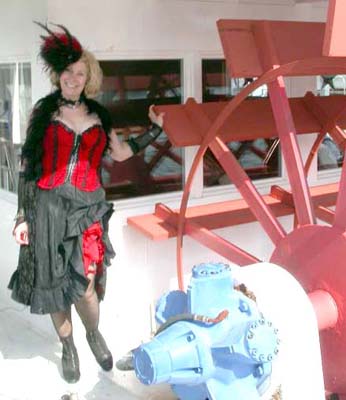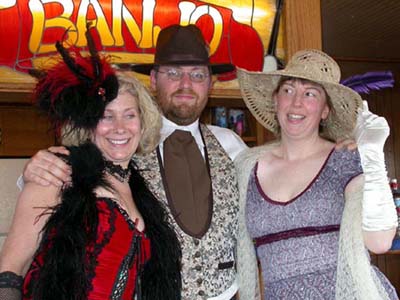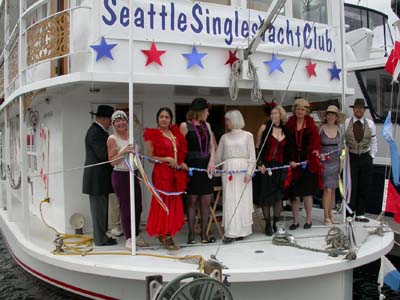Another Monday has come and gone. Still no message from Dave Cash. I could cry.
The night before Hurricane Katrina came ashore, I sent a tongue-in-cheek e-mail to Dave, in New Orleans. The subject line was “World’s largest bowl for soaking beans” and the text read: “If the whole city fills up with water, you could soak a LOT of red beans! Good luck with the storm — we’ll be thinkin’ of you and the Monday night gang.”
Looking back at the message, I cringe at my attempted humor. Even with the warnings and predictions, we all thought that the storm would bring only minimal damage to folks like Dave.
We met him at a birthday party in New Orleans. We’d been nervous and unsure, not knowing anyone at the party. The only other private party we’d been to had involved a lot of drinking, and someone had thrown his (not-quite-empty) daiquiri cup on my head. But Simon and Kalleen put on a low-key, fun celebration, with Lebanese food and a Mexican pinata. Guests took turns hanging upside down from Simon’s inversion table, with much hilarity.
Finally, they brought out two birthday cakes, ice cream cakes from Dairy Queen. Then Simon looked over at Dave, with whom I’d been chatting, and looked abashed. “Oh, sorry about that, Dave,” he said. Dave just smiled. “It’s OK,” he said. “I’m used to it.”
Dave Cash is a vegan, the only healthy-looking person I’ve ever met who eschews all animal products, including dairy products and eggs. (Most vegans I’d met were teenaged girls who live on peanut butter and celery.) At Simon’s party, Dave invited us to his house for red beans and rice. “I do it every Monday,” he said. “Give me your e-mail address, and I’ll add you to the invite list.”
The following Monday, the first e-mail arrived. The subject, “Red Sea’s Cleft Wide,” made no sense to us, but the salutation, “Hello, Hungry Person!” got my attention. The message included the time, address, and directions. At the bottom was the recipe for the beans.
What makes the weekly invitation special, and the reason we asked Dave to leave us on the list when we left New Orleans, is something called “beans lit.” Friends and participants in the weekly dinner send poems — limericks, haiku, songs — and Dave publishes one of them each week with the invitation.
The first invitation we received was especially fortuitous. It included a piece by Mike Hahn entitled “The Ballad of Bean Night,” and it actually explained Dave’s tradition:
(to the tune of “The Ballad of Jed Clampett” with apologies to Paul Henning and props to the late, great Buddy Ebsen)
Come and listen to a story ’bout a man named Dave
and the celebrated legend of the weekly feast he gave.
He came from Californy went on down to New Or-leens,
where his roommate Chris started cooking up beans.
Red beans and rice that is. Big Easy style. Nice and spicy.
Well, afore too long Chris moved outa town,
But Dave up and said “I think I’ll stick around”.
So he loaded up a pot with his special recipe
and started serving beans out for absolutely free.
No cost that is. Gratis. Everybody’s welcome.
Well the next thing you know Dave’s got a million friends
And folks might think this is where the story ends.
But the legend carries on, to everyone’s delight,
Beans are on at Dave’s place every Monday night.
Bean eatin’ and jawbonin’. Come on in and set a spell.
Take your shoes off.
Y’all come back now, y’hear?
We later found out that Dave had been doing this, every single Monday, for almost ten years. It’s not a potluck, although people occasionally bring a salad or some wine, and Dave never asks for money. Over the years, he’s built a small community around the weekly dinner.
At the time, the three-person crew of Cayenne was no stranger to red beans and rice, since Brian had discovered a 10-minute mix made by a local food company, Louisiana Fish Fry. He loved the stuff and could have eaten it every day. When I provisioned the boat for long-distance cruising, I tucked dozens of packages of it into every locker and crevice.
On that first Monday at Dave’s, I felt like I’d found an oasis in the middle of the desert. For me, the boatyard where we lived was a lonely place. I couldn’t converse with the men who worked there, all of them sexist, racist, or both. The people I ran into at the grocery store and the post office were from east New Orleans — black folks with their own social structure, not interested in friendly banter in the checkout line.
Suddenly, I discovered a whole new group of New Orleans people: People who were open-minded and liberal. We stood around the kitchen, grousing about politics and the war, and the conversation drifted to music, psychology, and books. It was an old kitchen, functional but not beautiful, with a long table along the wall for the crockpot and rice cooker. An open cupboard held dozens of multicolored handcrafted bowls, and there were plenty of mismatched spoons for everyone. A shelf over the beans held bottles of hot sauce, the variety looking like a grocery store display.
Dave explained that Monday beans is a tradition in New Orleans; in the old days, women who worked on plantations did laundry that day. The beans would simmer on the fire all day and be served up with minimal fuss in the evening, when the laundry-workers were tired. The same technique worked for Dave, whose beans simmered all day in the crockpot while he worked, too.
Barry and I tried to start a similar tradition in Seattle, while we were refurbishing our house. We sent out an e-mail invitation, cooked up a mess of beans and rice, and waited expectantly. From the message I sent Dave, the first week wasn’t much of a success:
“Well, it was a total bust, here in Seattle. We sent the e-mail out over the weekend, but nobody got it until Monday morning. Since Seattlites are notoriously un-spontaneous, nobody showed up! I think we’ll have better luck next week. We might be a bit tired of red beans & rice by next week, since we’re gonna be eating the leftovers ALL week, at EVERY meal.”
On week two, luckily, some of our Seattle friends came by. That inspired my first Seattle-based beans lit:
Way up here in Seattle we thought
We would cook Dave’s red beans in a pot
All the chickens are glad
And the cows are not mad
Now we hope our friends come eat a lot!
But my attempts were nothing like the real, New Orleans-based beans lit. We had asked Dave to leave us on the list, so every week an invitation appeared in our e-mail box. The first one of 2005, by someone named “Dapper Dave,” read:
I have never been one to believe in a higher power. However, after I started reading and writing Beans Lit. I started getting a glimmer of belief. How could it be just coincidence that “beans” rhymes so conveniently with one way of pronouncing “Orleans”?
A couple of months later, Dave was desperate. He had no submissions from his friends, and was forced to write the following himself:
I sure wish I had some nice penneds
From my bean-eating, scribbling friends
But alas I have naught
So I whine in this spot
And hope this sad word drought soon ends
This was so successful (or so awful) that Dave subsequently received five new submissions, including this winner from Tom McDermott:
One night, when low on his means,
Hunter Thompson came over for beans.
He smashed all the glasses
offended the lasses
then wrote up all of these scenes.
A few weeks later, McDermott had me on the floor, laughing:
One week when they tired of rice
Dave and Ana served red beans and mice
Their guests were appalled
Overwhelmingly galled
But both their cats thought it was nice
Laundry, one of the two cats, made a guest appearance in this poem, one of the last we received:
Laundry is in a quandary; she knows not what to do.
Should she stay with Dave and Ana, or start her life anew?
Eight more lives of eating cat food is an outlook horribly bleak
Compared to being able to eat red beans and mice once a week.
Not all the poetry rhymed. Dave Martin provided this lovely haiku:
How can seventeen
Syllables suffice to praise
The glorious bean?
Most folks wrote about the beans, this piece, from Dapper Dave, gave a different perspective:
From “A Liberation Manifesto from Friends of Oppressed Grains”:
Too long has a certain delicacy been called “red beans and rice”, for red beans would be nothing without the support of the noble rice grain. Red beans are totally dependent on rice to be edible. Not so rice, which is a delicacy when combined with many of the world’s finest foods. Demand that from now on this dish be referred to as “noble grains of rice with a few red beans”!
My favorites were always the ones by Mike Hahn, who Dave called “the father of the beans lit and the no-beans lit.” Hahn invented something called a “beanerick”:
A beanerick is a poem of five lines
With a-a-b-b-a ending rhymes.
Its strange sounding name
Derives from the claim
That at Dave’s we eat beans, not limes.
Hahn’s inspirations are varied, and he juxtaposes some weird stuff:
Hieronymus Bosch was uptight,
So he painted all the wrong sights.
Remove the sordid and doomed,
replace with tasty legumes,
For a Garden of Beanly Delights.
Not all of Hahn’s stuff was beanericks, as this piece illustrates:
Beans
I THINK that I have never seen
a poem as lovely as a bean.
A bean my hungry mouth does seek
to probe its form with tongue and cheek.
A bean that looks me in the face
And promises delightful taste.
A bean I measure head to head,
A prolate spheroid cloaked in red.
Upon whose bosom spice has lain,
That spark synapses in my brain.
Like all beans past and those to come,
To nourish us it will succumb.
For poems are made by fools and queens;
But only God can make a bean.
Dave only took a few Mondays off from red beans and rice each year. He had a stock message for those times when he was out of town:
“Regretfully, I must inform you that our usual Monday night beans and rice dinner will not be happening tonight. Unless you hear otherwise, we’ll be back at it next Monday. So keep your spoons sharpened and come see us soon!”
But Hahn was so inspired last year that he raised the bar. In addition to submitting beans lit, he also started writing no-beans lit, pieces Dave could send out on the rare occasions when supper was cancelled:
When Bean Night goes on hiatus
Dave emails to update the status
And his trusty bean pot
Stays stone cold, not hot
Cause he’s resting his bean apparatus
On August 22nd, we received the usual invitation with a subject line of “Rock Bridge O’er Tides” and a short poem by Rachel Watts. The following Monday, I didn’t expect to get an e-mail from Dave — I figured the power was out and he was “resting his bean apparatus.” But four Mondays have gone by now with no message to my in-box, and I wonder and worry. Where is Dave? Has he lost his computer and his e-mail list? Where are the rest of the folks who get together on Mondays? Will we ever receive another message?
I’m sure this is not the end of the tradition, and I’m keeping my spoon sharpened. Someday, I’m sure Dave will return, and the beans will bubble in the pot. Then Monday nights will again be like this (from David Martin):
‘Twas steamy and the garlic cloves
Did waft and tittle down by Dave.
All famished were bohemians
And auto mechanics raved.
Dave serves the beans on Banks, my friends –
these meatless beans they have no match.
knock and they will let you in:
there’s no doorknob but a latch.
Dave takes his kitchen knife in hand,
takes out the fixin’s he has bought,
not reading from some recipe
he chops into the pot.
And as a chopping there he stands
the red beans soaking e’er the same
the beans get spilled and get spilled good
a-burbling o’er the flame.
Two by two they’re through and through
Dave’s kitchen on a Monday night.
He leaves them fed and it is said
he does that very right.
Oh have you eaten Dave’s red beans,
vegan legumes: his fiendish ploy?
O Mondilicious-day! Callooh! Callay!
Dig in now don’t be coy!
‘Twas steamy and the garlic cloves
did waft and tittle down by Dave.
All famished were bohemians
and auto mechanics raved.
You can find Dave’s recipe on the recipe page of our site, under Red Beans and Rice from Dave Cash.





